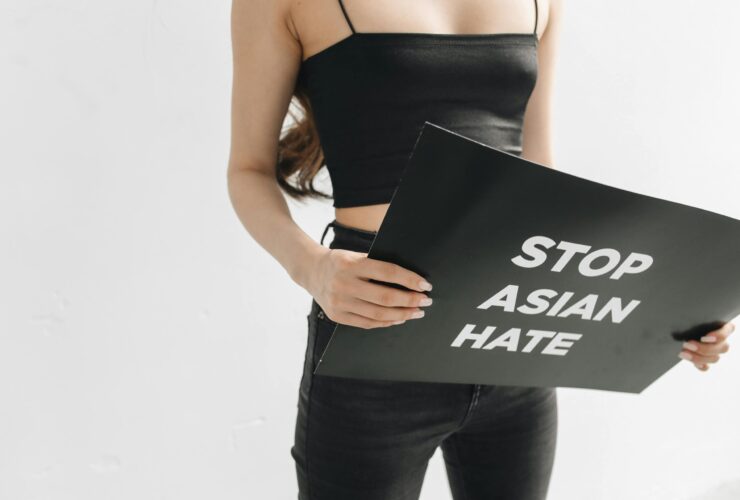Lately, it seems like we’re seeing daily accounts of attacks against Asian Americans on social media. Unfortunately, there has been an uptick in hate and anti-Asian sentiment over the past year. Parents may be worried their children are exposed to the negative news and wonder how that shapes their thoughts surrounding diversity and inclusion.
From a young age, children are aware of differences in race, gender, and ethnicity. They’re aware of the in-groups and out-groups. Moreover, children and teenagers have access to videos and pictures in the palm of their hands. It’s likely that they’re exposed to this information even if it isn’t discussed in school or at home. It’s also possible they’re not sure how to grapple with the idea of their family and friends being attacked. Sometimes, witnessing this kind of trauma is a collective experience. Therefore, repairing the hurt should be taken with a communal approach as well.
Recognize Your Own Discomfort
Parents may be unsure how to have conversations with their teens, however, it’s never too late to have the discussion. If you’re feeling unsure how to talk to your teenagers about racism, take a pause to think about your own reactions and how you’re feeling in your body when you hear about anti-Asian racism. You may notice discomfort in certain areas in your body. Make sure to take emotional breaks for yourself as well.
Let Your Teenager Guide the Conversation
Families tend to talk about issues of racism without realizing it. Children are attuned to what’s fair and what isn’t fair. By the time they’re teenagers, they have already been exposed to injustice and they’re trying to gain a sense of identity and values. Therefore, let your teenager guide the conversation. Ask them what they have seen and heard, how they understand what is witnessed, and what their reactions are.
Share Your own Reactions
You might choose that time to share your own reactions to the incident. If what they say is different from your own values, it’s important to keep the conversation open by modeling active listening and curiosity of their ideas. Allow them to openly express their emotions and let them know it’s okay to feel a range of emotions. If they become distressed, it may be a good time to allow them to practice some coping skills, such as taking a walk or engaging in a calming activity (e.g., reading, journaling, watching television).
Take Action
Some teenagers may feel helpless and powerless, while others may feel compelled to take action. Both reactions are okay and parents should support however their teens are feeling. Oftentimes, taking action provides a sense of control and agency. This can look like creating a support group at school, volunteering with agencies taking action against anti-racism, or even opening up the conversations with their friends to talk about their experiences and reactions to racism.
Validate Their Experiences of Racism
If your teenager has experienced racism first-hand, first, let them know it’s not their fault and they’ve done nothing to provoke someone to hurt them. Your teen may want to downplay the incident or even their race in order to fit in with others. However, parents can stress that while they can understand why the teenager would react that way, racism shouldn’t be tolerated. The next step would be to determine the safety of your teenager. Sometimes blocking someone who is posting racist comments is easier than engaging in a debate. Other times, your teenager may want to speak up. Exploring their thoughts and letting them decide may give them a sense of control over the situation. At that point, parents could present possible ways the teenager could neutrally confront the other person. “What made you think that?” “What you said made me uncomfortable.” “I don’t understand how that was funny.” If the other person continues to harass your teenager, you could let her decide if a police report should be filed.
If you or your teenager would like to discuss how racism has affected your family or process more about racism, our therapists in California and New York are culturally competent and trained to support people who are experiencing anti-Asian racism. Connect with one of our competent therapist today!
Start Therapy for Your Teen in California, Oregon, New York, or New Jersey Today
Don’t go at anxiety alone, seek out one of our competent therapist by booking an appointment today. Discover your agency, find ways to cope with your anxiety symptoms, and empower yourself to take charge of your life. Our caring therapists at our Los Angeles and New York City-based counseling center are skilled in many areas. They work with couples, teens, and individuals. Online service is available for all teens in California, New York, or Washington. In-person therapy services in Los Angeles are available in Arcadia, Burbank, and Manhattan Beach.
Other Services at Yellow Chair Collective
Further, they address issues such as postpartum therapy and trauma and PTSD. Additionally, they provide highly sensitive people treatment, burnout treatment, EMDR, and culturally sensitive therapy. All of these services can be utilized online anywhere in California and New York.
If you or your teenager would like to discuss how racism has affected your family or process more about racism, our therapists in California and New York are culturally competent and trained to support people who are experiencing anti-Asian racism. Connect with a multicultural or Asian therapist today.
Relevant Resources
Yellow Chair Collective: The Podcast | Asian Racial Stress & Trauma with Sharon Kwon
https://open.spotify.com/episode/3VXA1LZkUxml3uqvyfpwSq?si=WTby5eiKTaC1jce53TBGcg
Yellow Chair Collective: The Podcast | Healing From Trauma: Stanford Psychologist Dr. Christine Catipon Shares Tips to Nurture Yourself
https://open.spotify.com/episode/6sliIOsHFkj59Oc6og0vVO?si=heKdIufCTPK1zxNmkZsJnQ







Permalink
Permalink